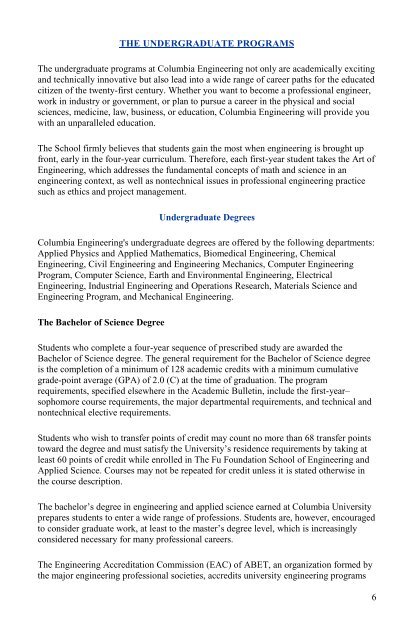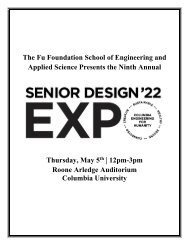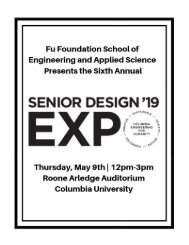SEAS Student Handbook
You also want an ePaper? Increase the reach of your titles
YUMPU automatically turns print PDFs into web optimized ePapers that Google loves.
THE UNDERGRADUATE PROGRAMS<br />
The undergraduate programs at Columbia Engineering not only are academically exciting<br />
and technically innovative but also lead into a wide range of career paths for the educated<br />
citizen of the twenty-first century. Whether you want to become a professional engineer,<br />
work in industry or government, or plan to pursue a career in the physical and social<br />
sciences, medicine, law, business, or education, Columbia Engineering will provide you<br />
with an unparalleled education.<br />
The School firmly believes that students gain the most when engineering is brought up<br />
front, early in the four-year curriculum. Therefore, each first-year student takes the Art of<br />
Engineering, which addresses the fundamental concepts of math and science in an<br />
engineering context, as well as nontechnical issues in professional engineering practice<br />
such as ethics and project management.<br />
Undergraduate Degrees<br />
Columbia Engineering's undergraduate degrees are offered by the following departments:<br />
Applied Physics and Applied Mathematics, Biomedical Engineering, Chemical<br />
Engineering, Civil Engineering and Engineering Mechanics, Computer Engineering<br />
Program, Computer Science, Earth and Environmental Engineering, Electrical<br />
Engineering, Industrial Engineering and Operations Research, Materials Science and<br />
Engineering Program, and Mechanical Engineering.<br />
The Bachelor of Science Degree<br />
<strong>Student</strong>s who complete a four-year sequence of prescribed study are awarded the<br />
Bachelor of Science degree. The general requirement for the Bachelor of Science degree<br />
is the completion of a minimum of 128 academic credits with a minimum cumulative<br />
grade-point average (GPA) of 2.0 (C) at the time of graduation. The program<br />
requirements, specified elsewhere in the Academic Bulletin, include the first-year–<br />
sophomore course requirements, the major departmental requirements, and technical and<br />
nontechnical elective requirements.<br />
<strong>Student</strong>s who wish to transfer points of credit may count no more than 68 transfer points<br />
toward the degree and must satisfy the University’s residence requirements by taking at<br />
least 60 points of credit while enrolled in The Fu Foundation School of Engineering and<br />
Applied Science. Courses may not be repeated for credit unless it is stated otherwise in<br />
the course description.<br />
The bachelor’s degree in engineering and applied science earned at Columbia University<br />
prepares students to enter a wide range of professions. <strong>Student</strong>s are, however, encouraged<br />
to consider graduate work, at least to the master’s degree level, which is increasingly<br />
considered necessary for many professional careers.<br />
The Engineering Accreditation Commission (EAC) of ABET, an organization formed by<br />
the major engineering professional societies, accredits university engineering programs<br />
6








